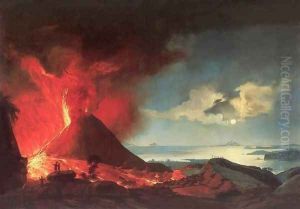Lajos Mezey Paintings
Lajos Mezey was a prominent Hungarian sculptor, born in 1921 in Budapest, Hungary. His career spanned several decades through the mid-20th century, a period marked by significant political and social upheavals in Europe. Mezey's work is noted for its exploration of human form and emotion, blending traditional sculptural techniques with innovative approaches that reflected the tumultuous era in which he lived.
Mezey's early life was steeped in the rich cultural heritage of Hungary, which deeply influenced his artistic development. Despite the challenges posed by the interwar period and the subsequent impact of World War II, he pursued his passion for art, studying at the Hungarian University of Fine Arts in Budapest. His education there provided him with a solid foundation in classical sculpture, yet Mezey was not content to merely follow in the footsteps of his predecessors. He sought to capture the essence of the human condition, drawing upon his experiences and observations of life's fragility and resilience.
Throughout the 1950s and 1960s, Mezey's work gained recognition both in Hungary and internationally. His sculptures often featured elongated forms and were imbued with a sense of movement and dynamism, reflecting the existential concerns of the post-war world. Mezey experimented with various materials, including bronze, stone, and wood, demonstrating a mastery over his medium that allowed him to convey complex emotional states through physical form.
Despite the political constraints of living and working in a communist country, Mezey managed to maintain a degree of artistic independence. His ability to navigate the intricacies of the cultural policies of the time without compromising his artistic vision earned him respect among his peers and in the wider art community.
Lajos Mezey's contributions to the field of sculpture were recognized with numerous awards and honors throughout his career. His works are part of public and private collections around the world, testament to his enduring legacy as a sculptor who captured the essence of the human spirit. Mezey passed away in 1984 in Budapest, leaving behind a body of work that continues to inspire and move those who encounter it. His art remains a powerful reminder of the capacity for creativity to transcend the constraints of its time, offering insights into the universal experiences of struggle, hope, and resilience.

